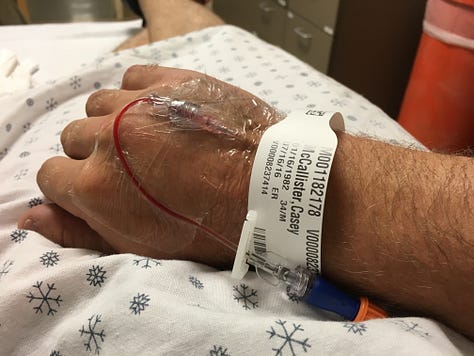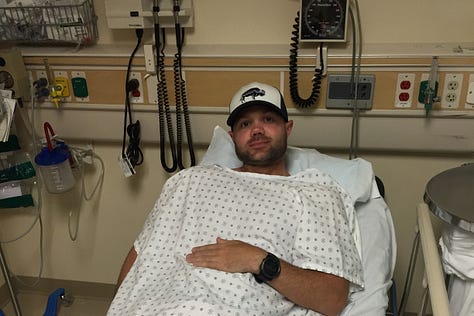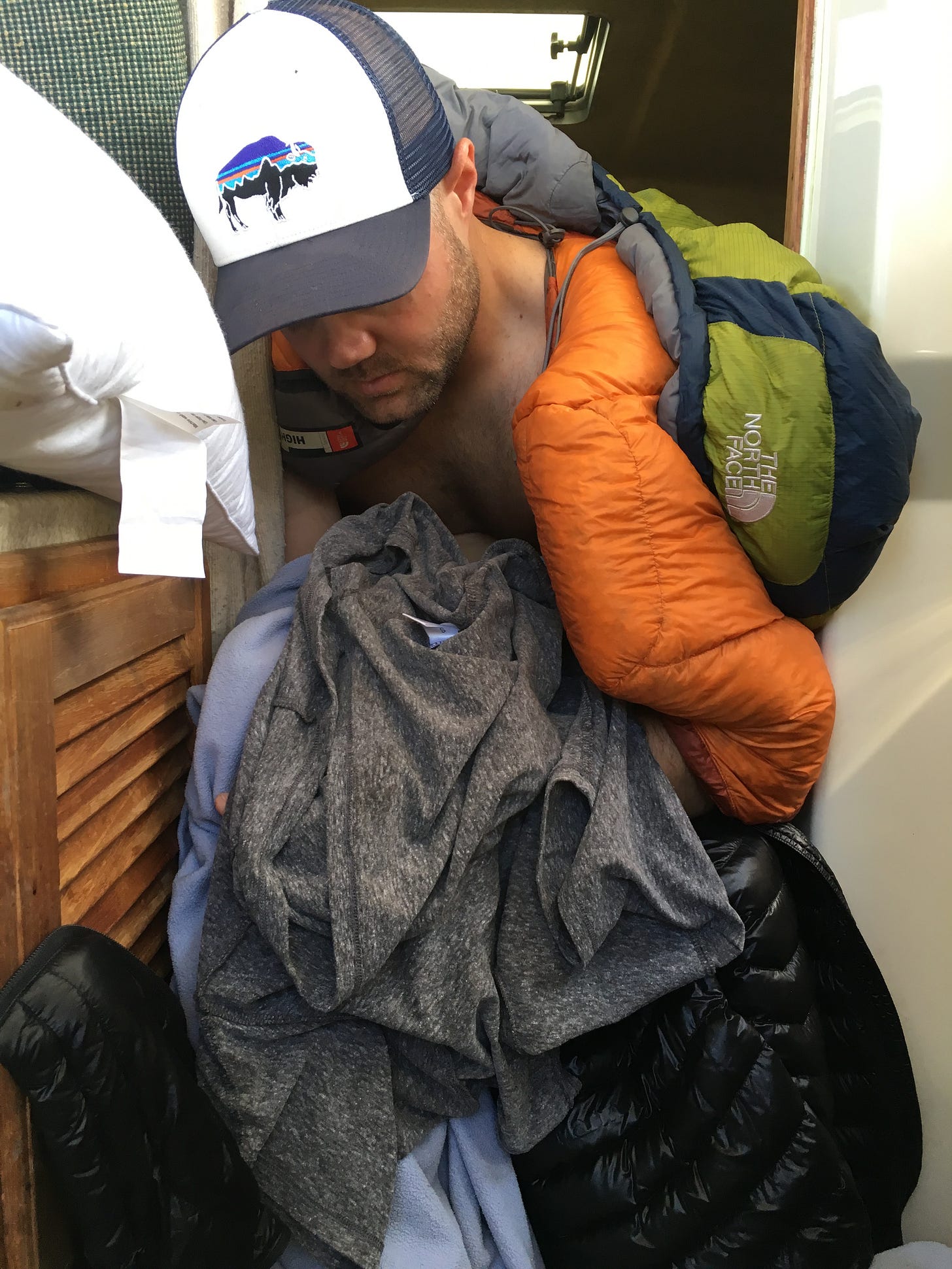An Adventure is Not Really an Adventure Until Something Goes Wrong
How I learned to be present in a small town Alaska emergency room.
There is this half-baked philosophy or maybe just a deeply embedded personality quirk, that I have carried with me for most of my adult life, and it goes like this:
An adventure is not really an adventure until something goes wrong.
Not minor wrong, like forgetting to pack socks, and not necessarily catastrophic wrong, like waking up in a tent face-to-face with a hungry grizzly bear, but wrong in that uniquely inconvenient, mildly chaotic, slightly absurd way that scrambles the plan and forces you to invent a new one in real time.
This belief is not at all about recklessness and more about presence. It is a reminder that discomfort often drags us kicking and screaming into the now. That moment where the expected turns into the unpredictable is where the good stories live. Or at least the stories that people ask you to re-tell again and again.
I first visited Alaska in 2012 on a photography trip and had quietly romanticized returning before even boarding the plane home. Alaska feels like one of the last few remaining landscapes untouched by the greasy fingerprints of human intervention.
It has this way of feeling completely indifferent to your presence. It is not hostile, exactly, but it does not care if you are there. The ocean is so clear and cold it almost feels fake. The silence is thick and uninterrupted. There are no billboards, few Wi-Fi signals, and no scent of car exhaust baked into the air. It is the kind of place that makes you want to do something dramatic, just to feel like you are a part of it.
In 2016, my friend and roommate, Joe, invited me back to Glacier Bay National Park, one of the most remote parks in the United States, tucked into southeast Alaska and reachable only by boat or plane. The park allows only 25 permits to access the waters at one time, so, at 1,600 square miles, it's a pretty safe bet that you won't see another human for days. I wasn’t looking for things to go wrong on this trip. But, as always, I was open to the possibility. Which is probably the same thing.
The trip began like many adventures before, with a mix of overconfidence and mild seasickness. I quickly found out that piloting a 26-foot boat through Alaskan inlets was nothing like the small bass boats I knew growing up in Texas.
Sleeping on the stern was fantastic. The ocean air felt sharp and clean. The sky was filled with stars that looked close enough to touch. Not just a few, but billions, scattered across the universe like sparks after putting fresh wood on a campfire. It was quiet too. The kind of quiet that feels rare. Just the sound of the water hitting the boat and an occasional shooting star overhead.
Our journey took us to several small fishing villages along the way to Glacier Bay. My favorite, Tenakee Springs, treated us to without question the best cinnamon roll I’ve ever tasted. To the cringe of my friend group, I still bring it up today at every opportunity. Tenakee Springs had no plumbing, so the town center came with a community toilet, that, when using your imagination you can figure out where the waste disappeared to. Pure Alaska.
My dramatic impulse came three days into the trip in the form of a simple polar plunge jumping into the icy Pacific from the roof of our boat. It made sense to me. Glaciers. Ocean. Floating somewhere between civilization and total wilderness. The equation felt solid. Strip down. Climb up. Jump in. I had done dumber things for less poetic reasons.
At this point in the story it is important to mention that I have a long and creatively annoying history of shoulder dislocations. The origin story involves high school football, which is a fairly noble starting point, but over the years the situations had become increasingly ridiculous. Opening a door. Rolling over in bed. Reaching too quickly for the remote. The bowl-shaped socket that once held my shoulder joint in place had turned into a plate. Eventually surgery was necessary to anchor everything back in place. It worked, mostly. Until it didn’t.
Standing on the roof of the boat, barefoot, shirtless, legs tingling with adrenaline, and I casually mention to my friends that maybe a backflip would be safer than a dive. The dive could jerk my arm strangely. A backflip would be cleaner. More vertical. Less risk. Probably.
We laughed.
I jumped.

What happened next was an instant and intimate reminder that I am not, in fact, a medical professional. I felt the joint slip out. Not in a dramatic snapping kind of way, but more like a reluctant evacuation. The arm went loose. Instant, but familiar, pain. It was dull and spreading and all-encompassing. Like someone was pressing on a nerve that was directly connected to my soul.
Swimming back to the boat with one arm was difficult.
We were two hours from Gustavus, which is not so much a town as it is a suggestion of a town. There is a dock, a few buildings, a ranger station, and a sense that people live there not out of convenience but out of sheer contrarianism. We immediately began heading there at a speed wavering somewhere between urgency and comfortability. Every wave between us and that dock send a ripple of pain through my body as the boat slammed into the ocean like a car crash.
Crash.
Crash.
Crash.
Over and over and over.
I tried to breathe evenly. I tried positive mantras pretending that everything was fine. I tried not to think about how difficult it would be to explain this to a medical professional with a straight face. My friends, still unsure if this was yet a serious matter, threw all of the blankets, sleeping bags, coats, and other insulating items on top of me in an attempt to keep me warm.
We radioed ahead. Explained the situation. Hoping for a calm voice on the other end with a plan, instead, we got a menu of increasingly dramatic solutions:
Option one: a nurse practitioner waiting at the dock.
Option two: a bush plane to the emergency room in Juneau.
Option three: a medivac helicopter to Anchorage.
The last two felt like punishments. So we asked them to call the nurse.
The nurse, upon hearing the words “dislocated shoulder” and “jumped off a boat for fun,” decided she wanted no part in it. Whether it was liability concerns or a philosophical disagreement with my life choices, I do not know. What I do know is that the excited Glacier Bay National Park rangers showed up like saints in Carhartts offering to drive me to a nearby airstrip.
The plane was small. Six seats. The pilot wore the style of sunglasses that suggested he had been doing this for far too long. He answered my questions with two-word responses that confirmed exactly that.
No security. No long jetway. We weighed the luggage, taxied down, and left Gustavus. It was 8pm. This was the last flight of the day.
As putting on a t-shirt with dislocated shoulder is a a monumental task, I was still shirtless, in swim trunks, and now shivering from the cold, unfiltered Alaskan air seeping through every gap in the fuselage. There was no pressurization. No insulation. Just metal and altitude and the low roar of propellers cutting through what felt like the edge of the known world.
Because this is not a medivac plane, my flight was not direct. We first had to drop off another passenger in Hoonah on her way home from a grocery run. Hoonah, a town with a population smaller than most high schools. The passenger, unfazed by my situation. From there, another hour flight to Juneau.
An ambulance was out of the question, so I hitched a cab ride to the emergency room. More bumps. As it goes, salting of Juneau’s roads in the winter does not make for a smooth ride in the summer.
Finally. The emergency room.
From there it all became strangely ordinary. Paperwork. Waiting. The warm relief of intravenous narcotics. A doctor who quickly popped the joint back into place with the casual confidence of someone flipping pancakes.
With newfound cell service, I texted my girlfriend, now wife, with a picture of my IV. At the time, we had only been dating for a few months, but she was not impressed that this was how I chose to make contact for the first time in two days.



It was over. Pain gone. Arm restored. Dignity mostly intact.
Total time with an arm in a position it did not belong: 10 hours
As it was almost last call, my friend Amy, who had happily joined my adventure for the laughs, and I grabbed a burger and a much-needed lager. We took the opportunity to stock up on a few supplies before catching some sleep in the hospital’s guest accommodations. We had to be up at sunrise to catch the first bush plane back to Gustavus. The adventure must continue.
The next morning, we’re reunited on the Gustavus dock - this time before breakfast - all of us quick to forget the strange events of the previous day and now focusing on what new adventures the days ahead would bring.
Lessons Learned
This is the part where I’m supposed to reflect. To mine the moment for wisdom. To pull out some tidy moral or hard-earned truth and hold it up like a souvenir from the gift shop of adversity. But the truth is, I’m not sure what the lesson is here.
Yes, I’m very stubborn. Yes, it probably wasn’t the smartest decision. Maybe this is where I’m meant to confess something about hubris or recklessness or that fuzzy line between brave and dumb. Maybe I should talk about respecting limits, or listening to the quiet voice that says “maybe….don’t.”
But I won’t.
Because I would do it all again. The leap, the second I hit the water, the pop in my shoulder, the slow burning dread, the garbled radio chatter, the tiny plane slicing through cold air, the nurse who declined and the doctor who didn’t. I would do it again without hesitation.
Not because I liked the pain or want to repeat it. I certainly didn’t. But those six hours had something most days don’t. They were vivid. They were specific. They pulled me fully into the now in a way that almost nothing else does. I wasn’t distracted. I wasn’t half-listening or scrolling or thinking ahead. I was there, in my body, in the world, in the moment. And there is something rare and strangely beautiful about that.
So maybe there isn’t a clear lesson. Or maybe the lesson is simply sometimes the wrong turn is the one that makes you feel most awake. Do the thing that scares you a little. Jump off the boat. But, maybe bring a jacket and know where the nearest airstrip is beforehand.
Amy: instagram.com/amyheiden
Natalia: instagram.com/natalia_stone
Joe Azure: instagram.com/jazurephoto
A quick epilogue to wrap this all up: several days after the shoulder was back where it belonged and the trip was nearly over, we rounded the final bend toward the home dock and our boat’s engine coughed once before quitting for good. Drifting in silence, dead in the water, just a few miles from the finish line.
Another misadventure, narrowly avoided. Or maybe just postponed.
—
Thanks for reading and I’ll see you in the next one.












